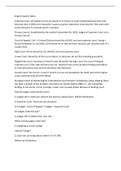English System Notes
Supreme Court: All English Courts are bound to it, House of Lords traditionally bound by own
decisions but in 1966 Lord chancellor issued a practice statement reversing this. HOL overruled
earlier decision; R v Kansalt and R v Cambert.
Privacy Council: Established by the Judicial Committee Act 1833; Judges of Supreme Court sit in
Privacy Council.
Court of Appeal: Civil + Criminal Division bound by old HOL and new supreme court, Young v
Bristol Aeroplane Co Ltd 1946, Civil Division by its own previous decision, per incuriam rule= R v
Cooper 2011.
High Court: All are bound by CA, old HOL and new supreme court
Crown Court: Bound by all the courts above, its decisions do not form binding precedents
Magistrates Court: Summary Criminal Cases, Bound by the high court, the court of Appeal,
supreme court, their own decisions are not reported and cannot produce binding precedents
or even persuasive ones and not bound by own decisions
County Court: the court is a court f record so it can set precedents for itself, but not for higher
courts and bound by all of the above.
European Court of Human Rights: International Court based in Strasbourg, Cases alleging there
has been a breach of the Europen convention on Human Rights 1998 s.2., not completely
binding to UK Courts, mirror principle, Lower court usually follow decision of binding court.
How do Judges really decide cases?
1) Judges don’t make law, declare law that has always been- William Blackstone
2) Supreme Court- Overrule own decisions
3) 3 Judges- Court of Appeal; 5 Judges – Supreme Court
Do Judges make the law?
1) Judges left to define their own role
When should judges make law?
1) Adapting to social change
Judicial Change?
1) Case law can bring about reform- R V R 1991
Reform by Parliament






